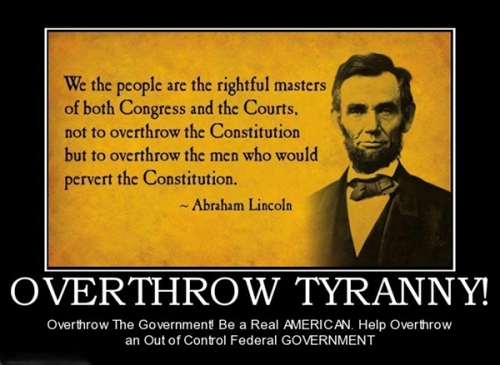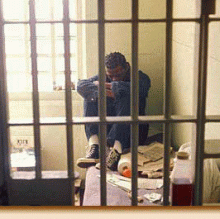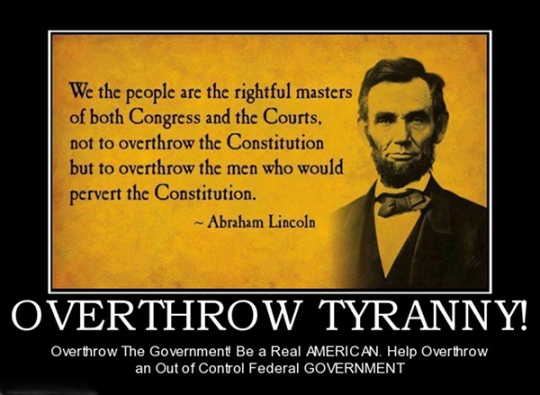Judges can jail alleged defaulters — who are not covered by the presumption of innocence — without a trial
by Mike Brunker
from MSNBC September 19, 2011

Barack Obama
It may not be a crime to be poor, but it can land you behind bars if you also are behind on your child-support payments.
Thousands of so-called “deadbeat” parents are jailed each year in the U.S. after failing to pay court-ordered child support — the vast majority of them for withholding or hiding money out of spite or a feeling that they’ve been unfairly gouged by the courts.
But in what might seem like an un-American plot twist from a Charles Dickens’ novel, advocates for the poor say, some parents are wrongly being locked away without any regard for their ability to pay — sometimes without the benefit of legal representation.
Randy Miller, a 39-year-old Iraqi war vet, found himself in that situation in November, when a judge in Floyd County, Ga., sent him to jail for violating a court order to pay child support.
He said he was stunned when the judge rebuffed his argument that he had made regular payments for more than a decade before losing his job in July 2009 and had recently resumed working.
“I felt that with my payment history and that I had just started working, maybe I would be able to convince the judge to give me another month and a half to start making the payments again,” he told msnbc.com. “… But that didn’t sit too well with him because he went ahead and decided to lock me up.”
Miller, who spent three months in jail before being released, is one of six plaintiffs in a class-action lawsuit filed in March that seeks to force the state of Georgia to provide lawyers for poor non-custodial parents facing the loss of their freedom for failing to pay child support.
‘Debtors’ prisons’?
“Languishing in jail for weeks, months, and sometimes over a year, these parents share one trait … besides their poverty: They went to jail without ever talking to an attorney,” according to the lawsuit filed by the nonprofit Southern Center of Human Rights in Atlanta.
While jailing non-paying parents — the vast majority of them men — does lead to payment in many cases, critics say that it unfairly penalizes poor and unemployed parents who have no ability to pay, even though federal law stipulates that they must have “willfully” violated a court order before being incarcerated.
They compare the plight of such parents to the poor people consigned to infamous “debtors’ prisons” before such institutions were outlawed in the early 1800s.
“I try very carefully not to exaggerate, but I do think that’s an apt comparison,” said Sarah Geraghty, the attorney handling the Georgia case for the Southern Center for Human Rights.
“And I think anyone who went down and watched one of these proceedings would agree with me. … You see a room full of indigent parents — most of them African-American — and you have a judge and attorney general, both of whom are white. The hearings often take only 15 seconds. The judge asks, ‘Do you have any money to pay?’ the person pleads and the judge says, ‘OK you’re going to jail,’” she added.
The threat of jailing delinquent parents is intended to coerce them to pay, but in rare cases it can have tragic results.
In June, a New Hampshire father and military veteran, Thomas Ball, died after dousing himself with gasoline and setting himself ablaze in front of the Cheshire County Court House.
In a long, rambling letter to the local Sentinel newspaper, the 58-year-old Ball stated that he did so to focus attention on what he considered unfair domestic violence laws and because he expected to be jailed at an upcoming hearing on his failure to pay up to $3,000 in delinquent child support, even though he had been out of work for two years.
The ability of judges to jail parents without a trial is possible because failure to pay child support is usually handled as a civil matter, meaning that the non-custodial parent — or the “contemnor” in legal terms — is found guilty of contempt of court and ordered to appear at a hearing.
He or she is not entitled to some constitutional protections that criminal defendants receive, including the presumption of innocence. And in five states — Florida, Georgia, Maine, South Carolina and Ohio — one of the omitted protections is the right to an attorney.
Randall Kessler, a family law attorney in Atlanta and chairman of the American Bar Association’s family law division, said states have a great deal of leeway in family law, which includes child support cases.
“The main reason states are patchwork is because family law is a local idea,” he said. “It’s very infrequent that the federal government gets into family law, except for international custody every now and then and violence against women. … Each community’s laws are different in the way they treat child support collection, and the right to a lawyer and the right to a jury trial varies.”
Supreme Court: No right to a lawyer
The child support program currently serves approximately 17 million U.S. children, or nearly a quarter of the nation’s minors, according to a recent study by Elaine Sorensen, a senior fellow at the Urban Institute.
Critics of incarceration without representation had hoped that the U.S. Supreme Court would end the practice in its ruling in Turner v. Rogers, a case involving a South Carolina man who was repeatedly jailed for up to a year after failing to pay child support.
But the court ruled 5-4 in June that poor parents are not entitled to a court-appointed lawyer when facing jail for non-payment of child support. Instead, the justices said, states should use “substantial procedural safeguards” to ensure that those who have no means to pay are not locked up.
That is likely to force the states that don’t guarantee the right to an attorney to tighten their policies, said Colleen Eubanks, executive director of the National Child Support Enforcement Association, which represents state agencies. “Obviously they’re going to have to look at changing the rules,” she said.
Ken Wolfe, a spokesman for the federal Administration for Children and Families, which imposes some rules on state child support enforcement agencies in exchange for funding, said the agency expects to issue guidance to the states next month regarding the Turner case. He declined to provide any details.
But Libba Patterson, a law professor at the University of South Carolina and a former director of the state Department of Social Services, said the Supreme Court ruling provides “very weak protections” for poor parents and is unlikely on its own to solve the problem of wrongful incarceration of poor parents.
“It depends on the extent to which the court is truly interested in making a full inquiry on the ability-to-pay issue and on the resources the court has and the amount of judicial time,” she said.
Even in states where the non-custodial parents do have the right to a lawyer, those without the financial resources to meet their child-support obligations still frequently land in jail.
A 2009 study by the Urban Institute, a nonpartisan policy think tank in Washington, D.C., found that only half of the child support debtors in California prisons had reported income in the two preceding years. And the median net income of the others was a mere $2,881.
65 percent of paycheck taken
Geraghty, the Southern Center for Human Rights attorney, said part of the problem is that courts often order poor parents to pay too much for child support in the first place, increasing the likelihood that they will fall behind on payments.
“One of my former clients worked at the Piggly Wiggly (supermarket) and they were taking 65 percent of her paycheck,” she said. “It left her in a position where there was simply no way that she could survive on the amount that she had left.”
No one can say how many parents are jailed each year for failing to pay child support, because states typically do not track such cases.
But an analysis of U.S. Bureau of Justice statistics in 2002 by the Urban Institute’s Sorensen found that approximately 10,000 men were in jail for non-payment of child support, representing 1.7 percent of the overall U.S. jail population.
Most observers believe that number has risen as a result of the troubled U.S. economy.
In fiscal 2009, the most recent year for which statistics are available, the Child Support Enforcement program saw child support collections decline for the first time in the history of the program, dipping 1.8 percent, the GAO reported in January.
At the same time, payments collected from unemployment insurance benefits nearly tripled, and the number of cases in which children were receiving public assistance also rose.
Military veterans, who often struggle to find work when they leave the service, appear to be particularly at risk.
Lance Hendrix of Adel, Ga., an Army veteran, said he fell behind on child support for his 4-year-old daughter after he left the service and couldn’t find work.
“I was arrested and I went to jail and they asked me all sorts of questions,” said Hendrix, who also is a plaintiff in the Georgia lawsuit. “I was never told I was under arrest. And I was never read my rights. So I did not know what rights I had. Of course, I’ve seen all these movies, but half that isn’t true.”
Not having a lawyer in a civil contempt hearing increases the likelihood that the parent will be jailed, even if he or she is not guilty of “willfully” defying the court’s order, say critics of the policy.
‘Wrongfully imprisoned’
“In the absence of counsel … it appears that the opportunity to raise the defense is often missed, and large numbers of indigent parents are wrongfully imprisoned for failure to meet child support obligations every year,” according to a friend-of-the-court brief filed in the Turner case by the American Civil Liberties Union and other groups.
The deck is further stacked against the delinquent parent because the state often acts as the plaintiff, seeking to recover the cost of providing public assistance to the child, Geraghty said.
Officials of Georgia’s Child Support Services agency declined to comment on the state’s child support enforcement policies or the lawsuit.
But Seth Harp, a retired Georgia state senator and former member of the state’s Child Support Guidelines Commission, said the state’s judges use incarceration sparingly.
“The methodology to put someone in jail requires that the person be taken to court before a judge and there they have to be found in willful contempt — someone who actively refuses to seek work or is hiding assets, something like that,” he said. “Judges don’t want to put people in jail. … The whole purpose is to get these people to support their children.”
Harp said he’s seen the tactic work repeatedly in his long career as a family law attorney.
“You can’t get blood out of a turnip, but you can put the turnip in the cooler,” he said. “And in 34 years of doing this, it’s amazing, you put someone in the cooler and the money seems to come.”
Judge Janice M. Rosa, a supervising court judge in New York’s 8th Judicial District and a board member of the National Council of Juvenile and Family Court Judges, said the system in her state adequately protects non-custodial parents by guaranteeing them a court-appointed lawyer if they cannot afford one and carefully determining that they have the ability to pay.
“No one here is going to jail when a factory closes down and you’re one of hundreds looking for a job,” she said. “… Every state has said that debtors’ prisons are illegal, and you have to give these people a way out. You can only put them in jail if they have money and won’t pay.”
Attempt to assist both parents
Eubanks, the National Child Support Enforcement Association official, said state programs in general are doing a better job in recent years of ensuring that the poor aren’t unfairly locked up by instituting programs to help non-custodial parents improve work, life and parenting skills.
“Five to 10 years ago, the program was pretty much about enforcing support. But now it’s moving to the understanding that if parents are going to support their children, they need assistance,” she said. “Our philosophy is to provide whatever tools we can to both parents to support their children.”
She also said the recent Supreme Court decision prompted the association to conduct training and outreach to ensure that state agencies are aware of the issue and have adequate safeguards in place to prevent indigent parents from being wrongly jailed.
That is no comfort to Miller, the Iraq war veteran who was jailed for three months. He said jailing parents who fall behind on their payments is counterproductive and should be reserved for only the most egregious violators.
“I feel like it’s more unfair to the kids, because now not only do the kids not get any money, nor do they even get to spend time with their fathers once they get locked up,” he said. “The closest you can get is visitation, and who wants their kids to see them behind bars or behind glass.”
******
This site contains copyrighted material the use of which has not always been specifically authorized by the copyright owner. We are making such material available in our efforts to advance understanding of environmental, political, human rights, economic, democracy, scientific, and social justice issues, etc. We believe this constitutes a ‘fair use’ of any such copyrighted material as provided for in section 107 of the US Copyright Law. In accordance with Title 17 U.S.C. Section 107, the material on this site is distributed without profit to those who have expressed a prior interest in receiving the included information for research and educational purposes.
 As an American Citizen, you want to believe that any person can rely upon judicial fairness in a child support proceeding. The outrageous child support law on the books today is designed to treat all child support debtors like a piece of garbage. The wisdom of common sense, respect, judicial fairness, doesn’t exist under the present law. The mastermind of this unconscionable child support enforcement law was created by former Senator Bill Bradley of New Jersey.
As an American Citizen, you want to believe that any person can rely upon judicial fairness in a child support proceeding. The outrageous child support law on the books today is designed to treat all child support debtors like a piece of garbage. The wisdom of common sense, respect, judicial fairness, doesn’t exist under the present law. The mastermind of this unconscionable child support enforcement law was created by former Senator Bill Bradley of New Jersey. I would like to focus on the requirement of proof of substantial change in circumstances necessary in requesting a review of child support outside 3-year cycle. The law offers no guidance whatsoever on what constitutes a substantial chance in circumstances. Similarly, the Office of Child Support Enforcement offers no guidance either. With no guidance whatsoever, the law requires payments to be maintained without regard of a citizen’s ability to pay.
I would like to focus on the requirement of proof of substantial change in circumstances necessary in requesting a review of child support outside 3-year cycle. The law offers no guidance whatsoever on what constitutes a substantial chance in circumstances. Similarly, the Office of Child Support Enforcement offers no guidance either. With no guidance whatsoever, the law requires payments to be maintained without regard of a citizen’s ability to pay. My researched has revealed that most Americans are unaware that our federal government reimburses States 66% of collection cost expended for child support enforcement, see Title IV under the Social Security Act. This doesn’t bother me, but the additional incentive dollars the States receive to treat citizens like garbage does. Under Title IV:
My researched has revealed that most Americans are unaware that our federal government reimburses States 66% of collection cost expended for child support enforcement, see Title IV under the Social Security Act. This doesn’t bother me, but the additional incentive dollars the States receive to treat citizens like garbage does. Under Title IV: So regardless of a child support debtors changed financial circumstances, a family court judge will routinely deny any request for a reduction or, even a temporary reduction. The unfortunate truth, family court judges armed with physic abilities to determine a citizen’s earning abilities, don’t care. They are the front line in defending the State’s performance incentives. A family court judge will bully a citizen by denying any type of relief sought, suspend your driver’s license, professional license, passport, may incarcerate you for failure to pay child support without a finding of ability to pay, intercept your tax return, garnish your unemployment or workman’s compensation, destroy your credit, and your home State will receive additional incentive dollars from our federal government for doing this to you. This is not only insane, cruel, unconscionable, but definitely creates an appearance of impropriety.
So regardless of a child support debtors changed financial circumstances, a family court judge will routinely deny any request for a reduction or, even a temporary reduction. The unfortunate truth, family court judges armed with physic abilities to determine a citizen’s earning abilities, don’t care. They are the front line in defending the State’s performance incentives. A family court judge will bully a citizen by denying any type of relief sought, suspend your driver’s license, professional license, passport, may incarcerate you for failure to pay child support without a finding of ability to pay, intercept your tax return, garnish your unemployment or workman’s compensation, destroy your credit, and your home State will receive additional incentive dollars from our federal government for doing this to you. This is not only insane, cruel, unconscionable, but definitely creates an appearance of impropriety. The last time I checked, the 14th Amendment prohibits States from denying any person within its territory the equal protection of the laws. The federal government must do the same, but this is also required by the 5th Amendment Due Process Clause. All citizens should be entitled to judicial fairness in any court proceeding. I urge all citizens to write their elected officials and asked them to repeal this unconscionable law. Alternatively, send your elected official a strong message and vote them out of office. A debtor citizen cannot rely upon judicial fairness in a family court proceeding, if a State has a financial interest in maintaining additional incentives dollars.
The last time I checked, the 14th Amendment prohibits States from denying any person within its territory the equal protection of the laws. The federal government must do the same, but this is also required by the 5th Amendment Due Process Clause. All citizens should be entitled to judicial fairness in any court proceeding. I urge all citizens to write their elected officials and asked them to repeal this unconscionable law. Alternatively, send your elected official a strong message and vote them out of office. A debtor citizen cannot rely upon judicial fairness in a family court proceeding, if a State has a financial interest in maintaining additional incentives dollars.
 The
The  A system full of flawed logic that winds up hurting children more than it helps them.
A system full of flawed logic that winds up hurting children more than it helps them. But if a family finds itself in court, the system seems stacked against the poor. “Many states have two systems, one for married parents and one for poor people/welfare cases that are funneled through ‘paternity dockets’ where they barely get to say a word,” says Daniel Hatcher, a professor of law at the University of Baltimore and a prolific researcher of and advocate for child support reform. “It’s a tribunal that’s just about child-support and paternity. It’s crowded. Judges are jaded. They face huge case loads.” As the trend toward unmarried parenting continues, especially among the poor, these paternity dockets look to grow even more crowded, meting out rushed decisions to more families.
But if a family finds itself in court, the system seems stacked against the poor. “Many states have two systems, one for married parents and one for poor people/welfare cases that are funneled through ‘paternity dockets’ where they barely get to say a word,” says Daniel Hatcher, a professor of law at the University of Baltimore and a prolific researcher of and advocate for child support reform. “It’s a tribunal that’s just about child-support and paternity. It’s crowded. Judges are jaded. They face huge case loads.” As the trend toward unmarried parenting continues, especially among the poor, these paternity dockets look to grow even more crowded, meting out rushed decisions to more families. Maybe this obligation pushes him to scramble for a job. Perhaps it takes a few months. All the while, the child support debt has been accumulating. Now he has the monthly obligation plus back payment. (This is where the Bradley Amendment kicks in.) Some states terminate parental rights or throw a parent in jail or prison for back child support, or “non-compliance” with court orders. In South Carolina, the court can order the noncompliant father to appear to explain his delinquency, charge him $1,500 in the process, and jail him for up to a year. South Carolina is hardly an outlier. In Texas, a parent can be incarcerated even after he’s paid back his child support debt. (Texas is infamous for overcrowded courts, too. In one court in Harris County, Texas, a court master decided 500 paternity and child support cases in one day.)
Maybe this obligation pushes him to scramble for a job. Perhaps it takes a few months. All the while, the child support debt has been accumulating. Now he has the monthly obligation plus back payment. (This is where the Bradley Amendment kicks in.) Some states terminate parental rights or throw a parent in jail or prison for back child support, or “non-compliance” with court orders. In South Carolina, the court can order the noncompliant father to appear to explain his delinquency, charge him $1,500 in the process, and jail him for up to a year. South Carolina is hardly an outlier. In Texas, a parent can be incarcerated even after he’s paid back his child support debt. (Texas is infamous for overcrowded courts, too. In one court in Harris County, Texas, a court master decided 500 paternity and child support cases in one day.) In South Carolina, if the non-custodial parent accumulates $500 in back child support while unemployed, the state can suspend or revoke his driver’s license as punishment. Say our unemployed father is a truck driver. Without his license, he’s lost his ability to work, and probably his sense of autonomy as an adult, and his willingness to cooperate with a system that’s working against him. As Scott’s brother Rodney told the New York Times, “Every job he has had, he has gotten fired from because he went to jail because he was locked up for child support. He got to the point where he felt like it defeated the purpose.”
In South Carolina, if the non-custodial parent accumulates $500 in back child support while unemployed, the state can suspend or revoke his driver’s license as punishment. Say our unemployed father is a truck driver. Without his license, he’s lost his ability to work, and probably his sense of autonomy as an adult, and his willingness to cooperate with a system that’s working against him. As Scott’s brother Rodney told the New York Times, “Every job he has had, he has gotten fired from because he went to jail because he was locked up for child support. He got to the point where he felt like it defeated the purpose.” If a custodial parent—usually the mother—seeks Temporary Assistance to Needy Families (TANF, the program that replaced welfare) or food stamps, both parents are treated like bad children. The mother is required to name the father, establish paternity, and sue the father in court for support, even if they have an in-kind arrangement that’s working. The pursuit of child support can destroy relationships. The money, if he has it, often goes back to the state for supporting the brood, not to his children. Meanwhile, the dads who can’t pay may find themselves in jail or prison, unable to help mom in other ways, such as picking up the kids from school or throwing a ball around on weekends.
If a custodial parent—usually the mother—seeks Temporary Assistance to Needy Families (TANF, the program that replaced welfare) or food stamps, both parents are treated like bad children. The mother is required to name the father, establish paternity, and sue the father in court for support, even if they have an in-kind arrangement that’s working. The pursuit of child support can destroy relationships. The money, if he has it, often goes back to the state for supporting the brood, not to his children. Meanwhile, the dads who can’t pay may find themselves in jail or prison, unable to help mom in other ways, such as picking up the kids from school or throwing a ball around on weekends. In the 1980s and ‘90s, the notion of the “deadbeat dad” loomed large in the public conscious, in part because of one spectacularly flawed and widely-cited study—since retracted by its own author—that purported to show divorced mothers subsisting at a third of their former standard of living, while the fathers lived better than ever. For many custodial parents, child support is the road out of poverty. Much child support went uncollected, and enforcement policies were changed to improve the situation. Some policies worked; the Office of Child Support Enforcement today still publishes reports showing continued gains in money collected. Threat of jail was considered a good motivator for delinquent dads, and it may be in some cases.
In the 1980s and ‘90s, the notion of the “deadbeat dad” loomed large in the public conscious, in part because of one spectacularly flawed and widely-cited study—since retracted by its own author—that purported to show divorced mothers subsisting at a third of their former standard of living, while the fathers lived better than ever. For many custodial parents, child support is the road out of poverty. Much child support went uncollected, and enforcement policies were changed to improve the situation. Some policies worked; the Office of Child Support Enforcement today still publishes reports showing continued gains in money collected. Threat of jail was considered a good motivator for delinquent dads, and it may be in some cases. Old ideology probably contributes to our current policies as well—a view of faltering families that’s about as enlightened as something out of The Scarlet Letter. In England, Elizabethan Poor Laws of 1601 authorized towns to sue fathers of unwed mothers to reimburse them for assistance provided to their children. Early “bastardy acts” allowed colonies to incarcerate pregnant unwed mothers to protect the state from the financial burden of the child. Today’s laws are not as different as you’d expect. Lurking underneath lies an entrenched view that fathers are the lazy enemies of their own families, and poor mothers, in some way brought this on themselves. (You see this kind of view in the comments section of a recent piece in Concurring Opinions by law professors Naomi Cahn and June Carbone on the child support link in the Walter Scott affair.)
Old ideology probably contributes to our current policies as well—a view of faltering families that’s about as enlightened as something out of The Scarlet Letter. In England, Elizabethan Poor Laws of 1601 authorized towns to sue fathers of unwed mothers to reimburse them for assistance provided to their children. Early “bastardy acts” allowed colonies to incarcerate pregnant unwed mothers to protect the state from the financial burden of the child. Today’s laws are not as different as you’d expect. Lurking underneath lies an entrenched view that fathers are the lazy enemies of their own families, and poor mothers, in some way brought this on themselves. (You see this kind of view in the comments section of a recent piece in Concurring Opinions by law professors Naomi Cahn and June Carbone on the child support link in the Walter Scott affair.) But unmarried parents as a group get fewer resources, and if one parent sues the other in court, the kind of Orwellian child support laws that dogged Walter Scott kick in across the states. The overarching principle is the best interest of the child (a legal myth), but this aim gets subverted in policies that hurt the whole family.
But unmarried parents as a group get fewer resources, and if one parent sues the other in court, the kind of Orwellian child support laws that dogged Walter Scott kick in across the states. The overarching principle is the best interest of the child (a legal myth), but this aim gets subverted in policies that hurt the whole family.
 Why was Walter Scott running away from a policeman who tried to stop him because of a broken tail light? The media are trying to make a South Carolina policeman’s killing of a black man, Walter Scott, another sensational case of racism, but the media have missed the point of the tragedy.
Why was Walter Scott running away from a policeman who tried to stop him because of a broken tail light? The media are trying to make a South Carolina policeman’s killing of a black man, Walter Scott, another sensational case of racism, but the media have missed the point of the tragedy. Debtors’ prisons were common in England in the colonial period. You can read about them in the writings of Charles Dickens, who wrote from firsthand knowledge; his own father spent time in a debtors’ prison.
Debtors’ prisons were common in England in the colonial period. You can read about them in the writings of Charles Dickens, who wrote from firsthand knowledge; his own father spent time in a debtors’ prison. When corporations can’t pay their debts, they can take bankruptcy, which means they pay off their debts for pennies on the dollar over many years. But a man can never get an alleged “child support” debt forgiven or reduced, even if he is out of a job, penniless, homeless, medically incapacitated, incarcerated (justly or unjustly), can’t afford a lawyer, serving in our Armed Forces overseas, isn’t the father, or never owed the money in the first place.
When corporations can’t pay their debts, they can take bankruptcy, which means they pay off their debts for pennies on the dollar over many years. But a man can never get an alleged “child support” debt forgiven or reduced, even if he is out of a job, penniless, homeless, medically incapacitated, incarcerated (justly or unjustly), can’t afford a lawyer, serving in our Armed Forces overseas, isn’t the father, or never owed the money in the first place. The whole idea that a poor man is expected to support two households, including one with a child he never sees and may not even be his, is contrary to common sense and to all human experience. In too many cases, DNA investigations revealed that the poor guy is not the father of the kid for whom he is ordered to pay child support.
The whole idea that a poor man is expected to support two households, including one with a child he never sees and may not even be his, is contrary to common sense and to all human experience. In too many cases, DNA investigations revealed that the poor guy is not the father of the kid for whom he is ordered to pay child support. One case on this issue went to the U.S. Supreme Court in 2011, but it didn’t produce much relief. Michael Turner of South Carolina argued that his constitutional rights had been violated because he didn’t have a lawyer at his hearing, even though jail was the penalty if he lost. The Court ordered some minimal “procedural safeguards,” but didn’t tackle the issue of giving a father the fundamental right of due process before sending him to jail.
One case on this issue went to the U.S. Supreme Court in 2011, but it didn’t produce much relief. Michael Turner of South Carolina argued that his constitutional rights had been violated because he didn’t have a lawyer at his hearing, even though jail was the penalty if he lost. The Court ordered some minimal “procedural safeguards,” but didn’t tackle the issue of giving a father the fundamental right of due process before sending him to jail. To most of us, “debtors’ prison” sounds like an archaic institution, something straight out of a Dickens novel. But the idea of jailing people who can’t pay what they owe is alive and well in 21st-century America.
To most of us, “debtors’ prison” sounds like an archaic institution, something straight out of a Dickens novel. But the idea of jailing people who can’t pay what they owe is alive and well in 21st-century America. After Lance Hendrix returned from military service in 2009, he landed part-time construction work and odd jobs to help pay the child support he owed for his daughter. He managed to pay about $3,800, but when he couldn’t afford to the rest, a judge threw Hendrix in jail for four months.
After Lance Hendrix returned from military service in 2009, he landed part-time construction work and odd jobs to help pay the child support he owed for his daughter. He managed to pay about $3,800, but when he couldn’t afford to the rest, a judge threw Hendrix in jail for four months.
